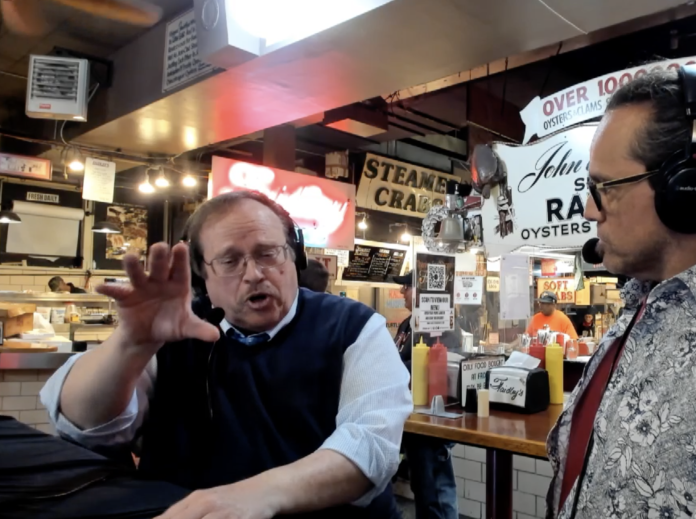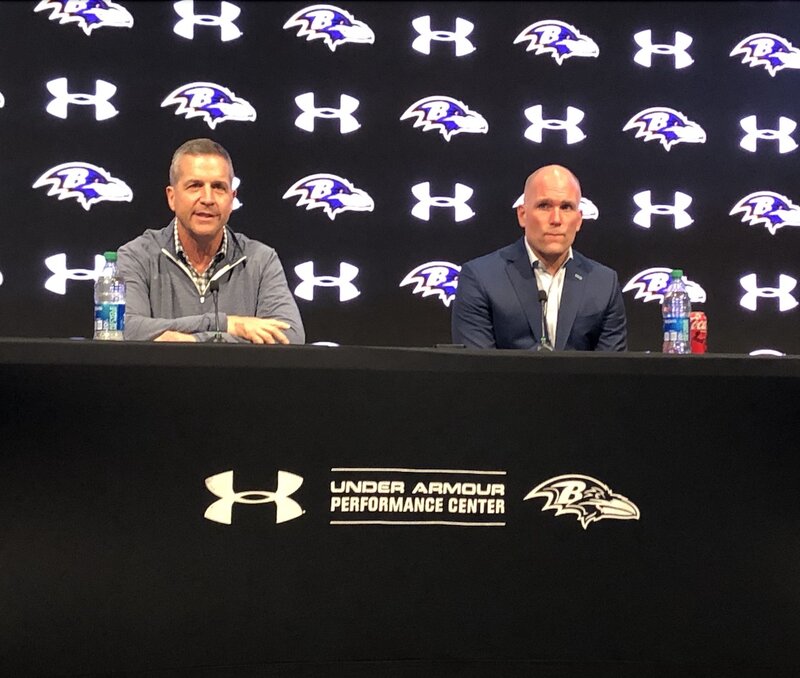Venerable Baltimore Sun editorial writer Peter Jensen discusses the importance and future of journalism with Nestor on the Maryland Crab Cake Tour at Faidley’s Seafood in the World Famous Lexington Market. Old colleagues spitting some truths here about lies and facts.
SUMMARY KEYWORDS
people, sports, sports writers, baseball, games, reporters, paper, day, baltimore sun, write, thinking, jensen, years, questions, point, lie, baltimore, walked, solution, oyster
SPEAKERS
Nestor Aparicio, Peter Jensen
Nestor Aparicio 00:00
What about w n s t, Towson Baltimore. And Baltimore positive or positively Dan fade leaves the old Lexington market since 7018 72. A number over there. It’s all brought to you by the Maryland lottery. I have some instant lottery scratch offs to give away. I’m looking for people to get people eat crab cakes and potato chips back here. I’ll be giving these away. I’m eating fried oysters. We’re gonna be doing the oyster tour beginning September 1 25 oysters and 25 days, if any of them are as good as these. I had never really had a fried oyster probably in my life until about a year ago. And I’ve just started eating these here at Bally’s. And if it’s fried, I like it in general. So Peter Jensen joins us here. Also on behalf of our friends and Windows nation, 866 90 days, yeah, I’ll put the hat on in a couple minutes. Here’s my favorite writer, curmudgeon from the Baltimore Sun. He’s been on the program many times with Don Mohler. And of course, see you later, Bill Henry back running the city in the rain. Your staff wrote a thing about John Angelos couple of weeks ago. Yeah. And you were part of that for opening day. Yes. And I said it’s time to call Janssen I know yet some off the field issues and when I so good to see you. Thanks for coming down.
Peter Jensen 01:08
Oh, not always for you Nestor.
Nestor Aparicio 01:10
Why would you get your crab cake for it’s all over to now? Do you eat crab cakes?
Peter Jensen 01:13
I can’t. I can’t. I’m allergic to shellfish.
Nestor Aparicio 01:17
Oysters have shells. I’m gonna pull it over this way. Oh,
Peter Jensen 01:19
good. Good for me. All right. How’s the sun? Well, we’re still coming out every day, every day. So it’s a it’s an exciting time. Actually, in many ways. We have a lot of younger people. We have, you know, a little more competition across town. It’s it’s energizing. It’s been really I think it’s been good for the paper. Well, I’ve
Nestor Aparicio 01:40
walked out of the airport. bleary eyed at 4am. After getting stuck in Vegas for a while come back from Maui. And I walked into salt Baltimore banner has taken the rusty scuppers place in the airport. And I saw it. And no, I mean, I like him to like me and him on the first thing that they said Baltimore banner sports. It was the first thing he said and I thought that’s the last thing they did. I’m a sports guy. Sports has always been a real rev generator around the paper. I went back got the 1966 Preview section for the news American Evening Sun and the Sun. I bought it up in Shrewsbury at an antique mall. And I saw the man ads and air you know, Jack Luskin on the back page and all that sports is still a real prime mover when a baseball team plays everyday and plays well. That’s my background, right? You remember me as a whippersnapper in 86, walking into the sun, I’m 17 years old. I mean, it was a rich sports department. And so many of those, the Tim corrections and Buster Oniisan, right, and look at the impact they’ve had on my colleagues when I was 17 years old. Yep. No wonder I’m well trained and good at what I’ve done. But the son has had a real history with all that I had Dan here, the last time we did the show here failures with maybe January, maybe early February, Dan Rogers came in that show he did with Baltimore and having read him now for a lifetime. I’ve read him for 40 years. There’s a part of what the sun has that the banners take it to pieces and Pam and this and that. But there is this history in this foundational part of the sun that I don’t want the sun to set. You know what I mean? I’ve been at war with the sons in the 90s when I laughed, and this and that and Jamison Hensley’s work, and they’re like we competed. You know, I have a tech service, we break news to Lamar sighs we were all in it sorted together. But the notion that it wasn’t good that it was just a one paper struggling paper owned by attitude. Like, there needs to be more reporters as a guy who has been thrown out of baseball, and the football team and a stronger paper or papers would have said to Chad Steele, you’re not doing that. Right. And that’s the way it used to work. People say to me all the time, like how could they throw you out? What will Jeff’s Rebeck and Jamison Hensley, know that this is designed to make them fear for their job. And that’s where we are with journalists being intimidated money going away. I worry about the future cities, because let’s be honest, I mean, Kathy Pugh might still be running the city for more for you guys. Right?
Peter Jensen 04:11
Well, yeah, like literally. Yeah, that’s true. And let me say, one more important part of the equation is that politicians find less necessary to talk to reporters than ever, because they have other ways to get their messages out through social media and other plots. Same as football players. Yeah, right. Right. Yeah.
Nestor Aparicio 04:32
So for football players, and for the guy who owns a team to be taking $600 million of state money to fund his billion dollar entity. Like, that’s kind of gross on the face of it if it didn’t involve football, but what’s really gross is not to have the accountability to even live your answer questions and then throw out 30 are journalists right like somebody else besides me in the media should be pissed about that? Yeah, I think yeah. And seeing you take on the Baseball owner and look man, you and I could do. I’ve done 30 years on the baseball on or I’ve written a book, you know and Peter principles. I’m re releasing that right now. Because there are a bunch of young people don’t remember the antics, you remember all of it. Yeah, you’re a baseball guy and a baseball. Right? You went to work at the paper when the baseball team was the only entity here there’s a sports match, right? And then Angelo’s bought the team and the antics of Angelo’s that first decade, it’s just, it’s incredible. And now we’re two decades later, and they’re, they’re winning, and the stadiums empty. And if there would have been more accountability all along, maybe it wouldn’t have bottomed out the way it did. Because there’s so much power and owning team, right and throwing people like me out for asking questions. Yeah, that intimidates the next line of people. And then he goes after Connolly on Martin Luther King Day, and you guys took a swipe at him what you got you invited here, we talk about the city, anything you want. Nobody punches at the owners other than me, right you one time, and I’m thinking to myself, That’s so not Ken Rosenthal and buster only and Rory Kaiser and Jack Gibbons, who always told me, you ask questions you call bullshit on the questions and ask them twice. And then fact check and then go back. And then you can write a column saying they’re doing a good job?
Peter Jensen 06:15
Well, let me say there’s a lot going on there. Right. Gotcha. And, and one of the things is going on is that there’s a lot to cover right now and fewer people to do it within every media organization. So back in those days that you recall so fondly? How many colonists alone did we have how many beat reporters how many people doing sidebars? The coverage was broader, and and deeper because we had the manpower
Nestor Aparicio 06:43
to this morning, I would have woken up the day after a draft. And I would have read. Let’s see here. If it was 25 years ago, Rosenthal would have had an opinion on Mr. Litt one would have had opinion on Ashati giving them the money. Eisenberg would have gone tactical and written a background piece about the cost of getting the deal done. And you’d have all this clarity in the morning song the day after Mark
Peter Jensen 07:08
Hyman would have had a piece about how you finance deals like that are the legal mechanisms.
Nestor Aparicio 07:13
Right? I mean, there would have been all of this information, trusted information from reporters who are seasoned, but Dan Connolly is flippancy to John Angelos with John Angeles will never give me an audience because he’s born on third and thinks he had a trip right? provided an audience on Martin Luther King day thinking that protected him from real questions, which was gross, but then calling out Connolly like, I think you people don’t know this, because like, Dude, it’s my job to know this. Right? If you Yeah, it’s my job. I know everything you’re doing, even though you don’t talk to me and answer questions. It’s my job to investigate you. Because the police aren’t doing it. Nobody’s investigating you. Other than us. Nobody’s asking questions other than us. And you can’t stand up. And that’s we’re now shot. He’s caught on to this shot. He has disappeared now, too. He doesn’t answer questions either. Right. And that’s not good. That’s not what got the Ravens here. That’s not what made the Orioles. Great. So from a sports perspective, I’m tremendously disappointed not in being thrown out as a journalist, that scumbag ish. I mean, it really is what they’ve done to me sleazy, and anyone should see it that way. But the accountability to answer questions, and when they do, and then he says he’s going to open the books. I mean, that’s absurd. No,
Peter Jensen 08:34
no, you mean it? I don’t think he meant it. He was said that to to pacify whomever he was talking about that moment, and I don’t think I finally figured out he doesn’t really want to do that very much.
Nestor Aparicio 08:48
Why are you the only one that’s willing to write that? That’s gross. I mean, I yeah, that’s my point. I mean, we say five columnist that would all call BS on that. Okay.
Peter Jensen 08:55
Well, let me let me offer some explanation. And what is that? You mentioned the manpower thing. So there’s, there are fewer people to do that role. Secondly, I think when there are fewer people, they have to get the basics done. And so all these people are doing just the basics. Third, I think there’s a reluctance for the media to write about the media in every occasion to insert ourselves into the story as it were, that’s just a natural reluctance people have. But But what concerns me the most about it is not that individual. Reporters sometimes get the back of the hand from the ownership. My concern is that the public dollars involved in supporting these professional sports enterprises are significant. And and we have these multimillion dollar sweetheart deals going with these guys. And that is what I would like to see held accountable. That is where I’m not convinced. We have scrutinized
Nestor Aparicio 10:00
Enough? Oh, they said they throw me out because they’re a private company, they can just do whatever they can
Peter Jensen 10:04
think that’s that’s absolutely true. And that is their right. However, the degree to which the taxpayers support this private company that deserves to be scrutinized. Now, if they don’t open their books, that’s their right, absolutely. But if they’re gonna say they’re going to do it, and then don’t do it, it’s also our right to say you’re a liar. And that’s all that’s, that’s no question. And meanwhile, it’s also our right to protect public dollars, that, you know, this 600 million of them that are going into renovations at Oriel Park, for instance, and I think that’s a that’s a strong public interests going on right there. And, and I think sometimes ownership shows that it’s gotten a little, you know, takes that all that stuff for granted.
Nestor Aparicio 10:46
Father has a question about that. I mean, and the accountability, part of answering questions. It’s, it’s no longer required, and it’s no longer expected. Yeah, let alone demand it. Yeah, there used to be a demand for it. Right. And because it’s the right thing to do,
Peter Jensen 11:03
because I’m not a sports writer. But let me back up and say, one of my first introductions to professional sports, was in Cincinnati. So I worked for the Cincinnati post, which was a very small afternoon newspaper, it’s now under business, like so many newspapers around the country. But because I was a young reporter, in my 20s, working in Cincinnati, I got pulled into major sports stories, because they needed the manpower. So Pete Rose is chasing tie cubs have consecutive hit games, I have to help out with the coverage. So I get to meet some of these guys and see what how sports writers Live, which I had not seen before. And, and then I have to help there’s something else. There’s a strike the next season for the Eagles. Yeah, this is like 8383 football streaming. So yeah. So I have to go then, to a to a Bengals game. And they pull me up to Paul Brown. Who is even then, like a legend. And he writes a note say, yeah, he can come cover the game for a personal note. He writes, I wish I’d kept it. But But so what I witnessed about about sports coverage then, and also drawn it like the the the record for Cal Ripken when I had to help out here was that what a strange world sports writing is. And I know it’s a you take it for granted.
Nestor Aparicio 12:29
I’m on the inside. So just give me your observation. Let
Peter Jensen 12:32
me let me say, all right, several things. One, and I don’t think people realize this, sports writers face the weird task of writing the same goddamn story. Every day, you know, Best Buddies, baseball writers, they show up for work, and there’s going to be a game played. And it’s going to be with a baseball, and everybody’s going to send in the field and hit or catch the ball. And at the end of nine innings, there’s going to be one team is going to win and the other team’s going to lose. And that’s that outcome will then have to create a story. So you guys can see all sorts of subtlety there. But in the big picture, it’s the same damn thing. 162 games every season. And there’s a second thing. Everybody has to work. The awful hours of a sports writer. So most sports writers, right as you know, second shift, because the games aren’t played
Nestor Aparicio 13:24
every well as the sports writer. Every story I ever wrote happened after 11 o’clock at night because I was an evening sun Reporter The game would end report Jaime Jackson be filing running down at the Civic Center. And I get to pack up my bags go back down to the array it back down to
Peter Jensen 13:39
be a study about sports writing and alcoholism. Because I’m certain there’s a strong crossover because so many of these guys worked till midnight 1am and then go home and after. After the weird part, dude, it never felt like work to me. Yeah. Because Oh, wait. That’s another thing in sports writers. They’re all hugely committed to their craft. Right? There are people who have loved it since the demand
Nestor Aparicio 14:03
is this. And now and maybe I’ll teach my audience something. Right. Like when I was when the first time I started covering baseball for real was in 92. Right. And my last name is Aparicio. So some of the older players would know my name, right? The Latin players obviously and then they found that I didn’t speak Spanish, which killed my credibility. It would help me immense I have spoken Spanish. Like it really would help me. Yep. But the credibility for any writer or radio guy is I was considered by most people in the modern era, was in what you knew. So when I would go into the 1992 Oriole clubhouse, and I would talk to Rick Sutcliffe about his career, or talk to Chris Moyles about him playing in AAA, knowing things about them when you meet them. Yeah, they figure out whether and this was something that really worked against women, right, or as a woman will come how much could she know about baseball? Right? Well, Molly Dhanam could know a lot. Right? You so Susan Ford off could know a lot, you know, but I had never met girls like that when I was a kid in Dundalk, right? That really knew sports as well as I knew it because they were girl, right? All these ballplayers like you know, grabbing her nuts, shoo in the tabacon. They wanted nothing to do with women in the locker room, right? But a woman like Bonnie Bernstein, who knew more about sports than me, could win them over. So for sports, it really was about the credibility of talking to the coach and knowing what the hell you’re talking about. Because if you didn’t you were done. Yeah. Like, it always made me Jack Gibbons sent me in the 80s. To cover golf. The LPGA Championship was here, Annika Sorenstam. One the year before it was in New Jersey, right? And he sent me up, and I’m like, You go cover like you, your reporter don’t cover it up. Doesn’t matter. You don’t need to know golf. I covered a triathlon. I knew nothing about triathlons, right. I always found those to be just awful, because I was only sheepish. I really didn’t know what the hell I was talking about. I was afraid of writing something wrong. Because I didn’t know I was an expert on it. You know, and I pretended to be an expert about music. I knew a lot about music when I was a kid. I knew a lot more now. But sports was something I never, I was fearless. Because I I could win anybody over because I wasn’t full of crap. Right? When I went up to a basketball coach, I knew the history, the terms we went up to hockey. That is, if you’re if you’re not like you’re not, they put you on the oral beat within a week you’ve been run off because like everybody was found you to be not invested enough not knowing enough history, whereas any reporter can go out and cover anything. But when your best reporters covered education, 30 years or egg guns covering arcade, whatever your beat is, when you know that beat it’s something but when you don’t in sports, you’re done. I never understood why they would send a neophyte out to cover a hockey game. You didn’t even know the rules and had already games. No, I thought that’s just that’s not fair to your audience, I think.
Peter Jensen 17:08
Yeah. Well, I couldn’t agree more. Although, I think knowledge enriches any coverage of any subject matter, not just sports. That’s that’s unquestionably true. However, the other thing that that I probably don’t even notice. But I noticed to me when I was a complete neophyte on this is that I think sports writers get treated pretty damn well. What I saw firsthand was, they get this great press area, where they have this wonderful view of games, they have catering in the press area, they are fed, often before games, although I’m, I believe news organizations also be paid for that. But but the accommodation, you know, free entry into the game, all all that stuff, guys take for granted. And then access to the in the locker room and to immediately following games there. There are press conferences that sort of let me say in the real world,
Nestor Aparicio 18:05
it’s not organized like that. You go out to the community and you write the story.
Peter Jensen 18:11
Yeah, right. Then nobody’s out there arranging to, you know, hand you the story. Yeah. It’s a little tougher. Well, I
Nestor Aparicio 18:17
think it’s what makes journalism so hard. And I guess the big picture this is you wrote this piece of criticizing the Orioles owner for being a friggin liar, which clearly is like lying is okay. The reason I did free the Burj back in oh six, as a civic duty to, to my audience was, I’m in there every day for the people for the fans that are paying. And I’m here to say and it was it was a Pacino moment for me and injustice for all these people are lying to you. Right? And they’re bringing me in as a reporter with a notebook. And they’re just making a shop. And they want me to go on the radio and vouch for them. And their credibility and their integrity. When I’m telling you they don’t have any. I’ve been here. They’ve lied to everybody. They lie to each other. It’s it’s a den of snakes, right? I mean, it’s vipers. And I saw this in O one, O two, O three, O four. And the Ravens weren’t operating like that, at that point. Right? The Ravens had a different way. And they were winning. And they had won the fans over. Right? And after Ripken left that period. Oh, 234-567-8910 11. They didn’t win. They were also 100 games most of those years. During that period of time. I saw it hurt the city man. You know, I lived on the 23rd floor. I bought my condo and oh three and there were 2.3 million people going to the games and all of a sudden there’s like nobody downtown. And I thought where where’s the accountability? Where’s What is your responsibility in that the citizens bought the stadium for you? You bought it and you’ve destroyed it? Yeah, and you’ve lied to everyone. I did the walk out and oh six as an answer to these people are lying to you and they’re asking me to shine up their turd and lie for them. And I’m not going to do it. And I’m not going to do it now for the Ravens or anybody else, because that’s why people 31 years still listen to me. Okay, you know me, that’s how you keep credibility is by not lying, because
Peter Jensen 20:12
you’re talking about things that are far beyond my knowledge base. No,
Nestor Aparicio 20:15
no, what I’m saying is that the sports part of it, and the reporter part is you’re there knocking on the door, you’re asking someone a question, you want to verify that it’s true if they’re known liar again, and again and again. And you’re on that beat? You got to call it what it is. You just do. And I think part of the integrity of being a journalist as a young kid, was if it’s not true, you can’t write it. Yeah, I mean, and it has it served me well in real life. But it’s it’s been difficult because I have such a BS detector. Right. And I call you a curmudgeon. I mean, that’s kind of a loving term to you. It’s sort of like pointing out the obvious. And calling the elephant in the room, the elephant in the room. Journalists get intimidated for that, right. I mean, take Khashoggi backwards, right. And awful things that happened. But this notion that we had a president for four years that turned every journalist into a bad guy, right, that that’s the part I’ve always been proud of being a journalist, right, different to being no offense to Dennis, Colossus, he used car dealer, or, you know, whatever that connotation would be of not dealing straight. If you’re a journalist, and you don’t deal straight, you’re not a journalist anymore, right? I mean, that puts you out of business. That’s what Jack Gibbons taught me.
Peter Jensen 21:24
No, I appreciate that. Let me say, if we’re talking more broadly, that it’s all it’s complicated. It is, people have gotten polarized politically. And so one party sees mainstream media as the enemy. And the other party doesn’t necessarily see them as friends, but doesn’t see them that way. And then you have, so they have all these layers of intrigue. And and you mentioned sports owners lie or sports executives lie. Everybody lies. We live in a world where people lie. That’s, that’s what we have to deal with. That’s reality. So you’re always fact checking. You’re always looking to reinforce things. And sometimes you just have to present. He said, he said, and let people have to sort that out.
Peter Jensen 22:43
Social media has changed everything social media has made people believe that they’re getting the truth when they’re not. And I have no solution for this, it falls on each of us to be our own skeptic to be cautious about what to look for trusted and reliable sources. But unfortunately, some people aren’t capable or aren’t interested in doing that. So the result is that people go to their corners, and they believe certain things. I guess and I don’t know the solution. Well, you
Nestor Aparicio 23:16
write on an editorial page where you’re opining about life in Baltimore, I generally write you can write about anything. When something comes to you, and you take a stance and editorial that that’s what papers have done forever, right? So you’re John Jensen, by the way, for Baltimore Sun, here’s our guest, it feels just to reset. You take that stance and, you know, I never, I wasn’t a big reader of that when I was a sports writer. But as I’ve gotten older, and tax dollars and the city and the everything about being a 55 year old versus being a 25 year old in the toy department, overall, Calvert Street, taking that on as a challenge and saying, I think the mayor is right or wrong, or I think the controller is right or wrong, or I think, you know, Annapolis is right or wrong or whatever. When basically, there’s so much that goes into that. It’s it’s it’s more complicated than knowing oriels history, right? I mean, it really, really is, and taking a stance on it and finding out taking in what this guy said. And these people over here said and say this is what I think it’s yes. Or a lot of people get to do that in in a journalism. So that’s true.
Peter Jensen 24:25
That’s true. And let me say it’s not what I think it’s it’s there’s a board and metro board, we discuss things. I often write the editorials but it represents the views of a larger group than just me. What does that mean board?
Nestor Aparicio 24:38
Tell me tell me how it really works the way alright,
Peter Jensen 24:40
so the opinion section the sun is governed by an editorial board, primarily three individuals. The opinion editor, Tricia Bishop, myself, and Michelle dill simmerman are the primary but also on any subject, the editor, the managing editor. might also make themselves part of the board’s bit of the voice of the paper is regarded as the paper. Yes. The Op Ed, of course is the outsiders voice. Our editorials are the voice of the paper. So normally they run right below the troll cartoon on the main opinion page and larger type to set them apart. And they since it says I think commentary is the title, but it’s editori. Is it ragged? Right to? I think it might be. I think there’s there’s a man who knows is
Nestor Aparicio 25:31
his point ragged right? Helvetica
Peter Jensen 25:35
Oh, my God. Yeah. So anyway, so. So that represents
Nestor Aparicio 25:38
my blog, dude. I mean,
Peter Jensen 25:41
sorry about that. But it’s so yeah, it represents a pain to the paper. And so it it, it gets reporters in trouble all the time, because we go after politicians that they then have to interview and don’t appreciate that they don’t make the distinction
Nestor Aparicio 25:55
high on from the sun. What you guys wrote it, I didn’t write it that headline, I didn’t write the headline, right. I mean, now, people don’t like criticism. They just don’t I mean, I don’t like it either. I’m more comfortable with it. But when the criticism comes from a place of, of improvement, it’s like parenting, right. Like, you know, when the criticism is, I don’t think you should do that you should do this. One of the issues for the city in general and why we started Baltimore positive is people say, What’s Baltimore positive? And like, why don’t pretend to have solutions? But I’m trying to find a smart people to have smart. Right. And the bottom son doesn’t have solutions. If we did, we would have solved it a whole long time ago, right. But there are thoughts to say this is bad. This is good in their recommendations. Do you think solution oriented? When you’re writing something like that,
Peter Jensen 26:44
sometimes sometimes there are obvious solutions. Sometimes there are not. So I think of it, I think of the process as a dialogue with the community, not from us high above deciding, oh, it should be this way. But pointing out the hard truths. And then that is should be engaging a process through which, collectively, we help solve our problems.
Nestor Aparicio 27:09
Some people see hard truth as criticism, right? Yeah. No hard truth.
Peter Jensen 27:13
Listen, when I, after something runs in the paper, and this is just every day, I get, you know, really nasty. Email. It used to read you used to be calls, nobody calls anymore. They just shoot email. And, and that’s, you know, I just, I just really want to go on going on for 37 years, I’m sort of used to it. You know, I’m
Nestor Aparicio 27:36
31 years into being a pin yada. My wife and my son aren’t always comfortable with it. But they’ve learned to understand that that’s part of the deal.
Peter Jensen 27:42
Yeah. Right. So that’s, that’s just how it is. And and you you develop a thick skin over time. And you’re comforted by the times when you think I got that, right. And look how things are getting better as a result of me pointing out that that truth, and that happens, not every day, maybe not even every week. But when it happens, you think that made a difference? And that’s and that’s significant. And that keeps you going well, I
Nestor Aparicio 28:09
think the media, but the newspapers specifically and television and what they report, and to some degree, what we do, even in social media, there is a point where you amp up pressure, you know, on whatever that situation is, yeah, to say this, here’s a potential solution. And sometimes Sure, the Baltimore Sun over 100 years, the many things that wound up on that page, that later on wound up happening because of the pressure of the papers on so I will tell you that and I’ve said this 100 times, and it’s I believe it to be true. The Washington Nationals would not exist if the Washington Post weren’t writing a series with failure weight and those guys about word, I’m thinking I just lost my train of thought there. I just lost them the business, the governmental business provision that baseball has, that they don’t have to answer anyway. Oh, right. Right. And I keep thinking eminent domain next night. I’m lost the word we’re wordsmiths. How can I? I’m embarrassed I’m turning red. Yes, yes. But from a baseball perspective, and having sort of the ability to just go your own way. Government can’t do that. The police can’t do that crime can’t do that. And when you guys step up pressure on organizations, there is a point where the The Washington Post point was the paper said Congress is going to come after baseball if we don’t get a team in Washington. I believe that that was incredibly important to bud ceiling that the Washington Post was beaten his ass and that the senators and the congressmen were reading it and they were going to come after baseball to go out with they have a they have a clause from 1920 Something judge Landis I’m free eight nonetheless. I came through two words. I can’t remember it. I can’t even Google it. But and I will before the segments of people in the audience are tweeting it to me now. But baseball was forced by the media by the local media by the Washington Post to do something because the paper ganged up on it right and the media ganged up on, there’s no more ganging up here. I guess that’s my point with the sun. Going back to the first question. The gang happens when the banner in the sun and Mar and Jay Z. And when everybody says this isn’t good, then things change. I think I think it’s
Peter Jensen 30:33
maybe I we may be past the time when traditional media can have that level of clout. I’m sorry to say it, no individual outlet has the level of clout that the Washington Post had 20 years ago, 20 years or even today, probably, it’s that the landscape has changed that dramatically. But that’s not not to say, we can’t try that we shouldn’t try that we shouldn’t be pushing hard truths that we shouldn’t be seeking better solutions. That’s, that’s eternal. But it doesn’t mean that will necessarily have the same batting average that we had before.
Nestor Aparicio 31:18
He’s Peter Jensen, I’m trying to find this word. Because if I put anti trust that was a trust and trust, I’m losing my mind to be two seconds and put MLB exempt anti trust. The it was the anti trust laws that they were really concerned about. Right. And it was the Washington Post in the media that really, in my opinion, birth the Washington Nationals it wouldn’t have happened. Had there not been the media saying to the government, you need to gang up on on this organization that they’re doing wrong. And I guess it’s part of the political process, everything that Trump stood for, right. Like Trump ran the country for four years and running himself in the prison by vilifying completely vilifying fake news. Fake news, right? Yes, every if you don’t like it, it’s fake news, right? Man, I just, it’s been such a dangerous thing for the society. And I think so it really has been.
Peter Jensen 32:10
And I think it’s so obviously that way. My disappointment is not that there are people like Donald Trump in the world, there are always going to be people like that. My disappointment is that people don’t see through it, that they don’t see how dangerous that as is how negative that is. And and I think, you know, this was this was set up by a number of circumstances. And the diminishment of the media over time is one of those circumstances that that made it possible for him to go even further and completely vilify.
Nestor Aparicio 32:41
Well, I hope we don’t diminish it further, because I appreciate what you do, what the banner does what all my colleagues do, in trying to hold, hold power accountable and speak, speak truth, to power. And it’s harder and harder to do. And there are fewer of us doing it. And I just respect the hell out of it at this point in my life, because it’s, I know how hard it is to do. I’m, I’m witnessing evidence piece number one and two, I dedicated my life to these sports franchises. And they’ve thrown me out right for reporting truth, right, or for or for the threat of maybe reporting truth, right, or for asking questions. And the only ones I’ve seen that come to that defense, not on behalf of my immediate past, but on behalf of the owner of the baseball team, who’s a born on third guy with thinks he hit a triple who’s sitting in the chair, for a guy who’s been a complete disaster for 30 years, continue to lie, and no one’s even willing to raise their hand and call all they want to do is buy tickets and go to the games and that that’s that’s not good. That’s dangerous there. There needs to be some accountability here. And I and especially without a lease to your point, right.
Peter Jensen 33:43
Yeah. Right. Exactly. That’s I mean, my interest is more in that area than what happens on the field. It’s, it is there is a transactional relationship here with government that needs to be monitored. And that sometimes gets overlooked is we get excited about, you know, signing stars or winning games. There’s also a dollars and cents thing going on. So they got
Nestor Aparicio 34:06
to do the right thing. Yeah. And they should be held accountable by someone. And it’s clearly not the fans at this point. I mean, it’s there’s a few of us and we get shot at and it’s good to see you. And I’m sorry, you can’t have a crabcake burger joint next time. Next time. Peter Jensen for the Baltimore Sun editorial writer. Yes. Not editor. No, not Pooh bah. Nothing like that. Oh,
Peter Jensen 34:29
just a minor underling. It’s been 37 years.
Nestor Aparicio 34:33
37 years since I walked in and you walked in. I my first day was January 6 1986. Was your first day the ball August 15 80. So I was there for eight months before you were that? Yeah. So you came after bias. Di bias died on June 6
Peter Jensen 34:46
last night and my friend Mike Kelly came to cover it. We both came from Cincinnati. I know if I remember my I do. Yeah, yeah, we just celebrated that celebrated. We commemorated the 20th anniversary of his passing in Oh Over DC just last Sunday.
Nestor Aparicio 35:02
Well, it’s beautiful. We remembered his name then. Absolutely. But you know that that whole time and at six I was 17 years old. My parents had to sign a permission slip for me to join the Baltimore Washington newspaper guild. I was out on the pavement the next year walking the picket line.
Peter Jensen 35:17
Yes, you know, yes. Where was your station on the picket line?
Nestor Aparicio 35:20
I was on the backside on Guilford at the Guilford entrance on the back where
Peter Jensen 35:25
I was I was a captain. I was a captain. And I was we were stationed at the at the circulation.
Nestor Aparicio 35:32
Shoot of 87. Is that right? I think it’s June 87.
Peter Jensen 35:36
It was 87 for sure. I summer.
Nestor Aparicio 35:38
Why no was summer. Here’s why. No, I did all my duty. The cicadas were out. There was 87 there. Absolutely. So it’s June of 87. And we went on strike. And it was I’m trying we’re a week what did we yell? Ah, gosh, I’m trying to trying to think I know we had a like a little refrain, yell back. But we walked with the size what was nice, and I remember I was 17 I’m thinking and all the guys even in the management like this strikes not gonna last long. It’d be a week or two we’ll figure it out. We always figure it out. I’m like yeah, and I’m 17 you know squeezing nickels pay my mortgage for dollar mortgage right and three quarters percent by the way overcame street
Peter Jensen 36:18
lighting was really expensive that Yes, right. So
Nestor Aparicio 36:22
I’m a little afraid of like, you know, starving to death. But I was 1718 and I was 18 that but summer. And I if you were my strike cap, and I think it was Joe Jacobsen quite frankly,
Peter Jensen 36:33
no, no, no, I was I said I wasn’t at the 501 I was up the street two blocks up the street. So were you there the Belvedere hotel that night we voted yes. And they turned away the train at the back entrance to to Guilford they there was a paper train you I was back when the presses of course were there. And they were the delivery of of paper coming in and they they lined up and forced the paper the the train did backup on the side. So there
Nestor Aparicio 37:03
was no paper to print the paper. Okay. I don’t remember that. But I absolutely remember being in the Belvedere and voting. So what I did was I did my strike assign with Joan Jacobson. I said, so I got for our you know, whatever was duty three. I said,
Peter Jensen 37:20
Well, you would have an early start because of your alphabetical disadvantage.
Nestor Aparicio 37:24
Aparicio. Yeah. So you’re gonna Wagner you’re young or some I
Peter Jensen 37:31
was midday because Jay worked out great. Well,
Nestor Aparicio 37:35
I did my duty and I did like for him one day. I did like a whole day of walking. And they gave me three days off and with Ocean City. Oh, I met a girl. Oh, I Carol hope you’re well. Good to see your grandkids. So I remember the girl I met. So Peter Jensen is here. We walked the picket line together 36 years
Peter Jensen 37:52
36 years ago? Yeah. 36 years ago. It
Nestor Aparicio 37:54
all worked out all right. Northside. Though he’s not eating shellfish, even the word fails. That means more oysters for me. We’re going to be doing the Maryland crab cake and oyster tour in September for our 25th anniversary. It is all brought to you by the Maryland lottery instant scratch off, you get to play if you want to play free ticket there for Peter Jensen from the Baltimore Sun. We’re giving tickets out of your favorites. We’re going to be on Thursday of next week in Middle River. We’re going to be at MC falls oyster and we’ll keep wanting to say Iron Horse tavern because that’s the one near my radio station. This is a new location over Middle River, the old Sioux Island. We’re going to be there Thursday from two until five. We’ll have great guests as well. My thanks to Peter Jensen. My thanks to Danny Han, to all the guests we’ve had here including the capital areas as well. We are wn st am 5070, Towson Baltimore. And on behalf of our friends at window nation, I’m rolling the windows up because it’s springtime. We are wn st ame 5070, Towson Baltimore and we never stop talking. Baltimore positive

































